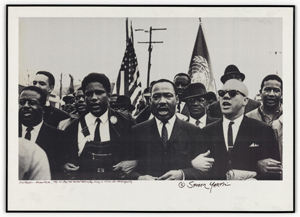Honoring Black History Month: African Americans and International Human Rights
February 28, 2022
By Carrie Booth Walling

Civil Rights-Human Rights, the U.S. flag and United Nations flag bring a vision for world equality.
The American civil rights movement and the international human rights movement have long been interconnected.
- The Reverend Dr. Martin Luther King Junior was both an American civil rights leader and an international human rights leader. Indeed, King argued that American civil rights law was indivisible from international human rights law and joined together through the United Nations Charter.
- In 1947, W.E.B. Du Bois and the NAACP submitted a document to the United Nations titled, “An Appeal to the World: A Statement of Denial of Human Rights to Minorities in the Case of Citizens of Negro Descent in the United States of America and an Appeal to the United Nations for Redress.” They asked the UN to redress human rights violations that the US committed against its African American citizens. Du Bois and the NAACP believed that the United Nations’ discussion of human rights was an opportunity to mobilize international public opinion for their cause and to align their plight with that of other oppressed people.
- Ralph Bunche, born in Detroit, Michigan, was an American diplomat, leader of the decolonization movement at the United Nations, and the first African American to be awarded the Nobel Peace Prize in 1950 for his mediation work with Palestine. Bunche argued that human rights are essential to peace and that peace and freedom are inseparable. While at the UN he was an ally of the American civil rights movement and Dr. King who met with him at the United Nations in 1967 to express his opposition to the Vietnam War. Dr. King fought for civil rights at home, and for human rights and an end to war abroad.
- In Atlanta, Georgia, the National Center for Civil and Human Rights is a museum and cultural institution that connects the U.S. civil rights movement to human rights challenges today. Opened in 2014, the Center is also a human rights organization that seeks to inspire people to tap into their own power to change the world around them.
- In June 2020, the United Nations Human Rights Council held an urgent debate on “current racially inspired human rights violations, systemic racism, police brutality against people of African descent and violence against peaceful protests,” in response to George Floyd’s murder by police officers in the United States. UN human rights experts, including Professor E. Tendayi Achiume, immediately condemned the killing of George Floyd as a “modern-day racial terror lynching” and warned that given “impunity for racial violence of this nature in the United States, Black people have good reason to fear for their lives.” They also credited US civil society for responding by “putting forward ideas to recreate public security grounded in human rights.”
- The Equal Justice Initiative is committed to ending mass incarceration and excessive punishment in the United States, challenging racial and economic injustice, and protecting basic human rights for the most vulnerable people in American society.
American civil rights are human rights. The Universal Declaration of Human Rights sets out fundamental human rights to be universally protected. Its 30 articles include civil, political, economic, social, and cultural rights for everyone.